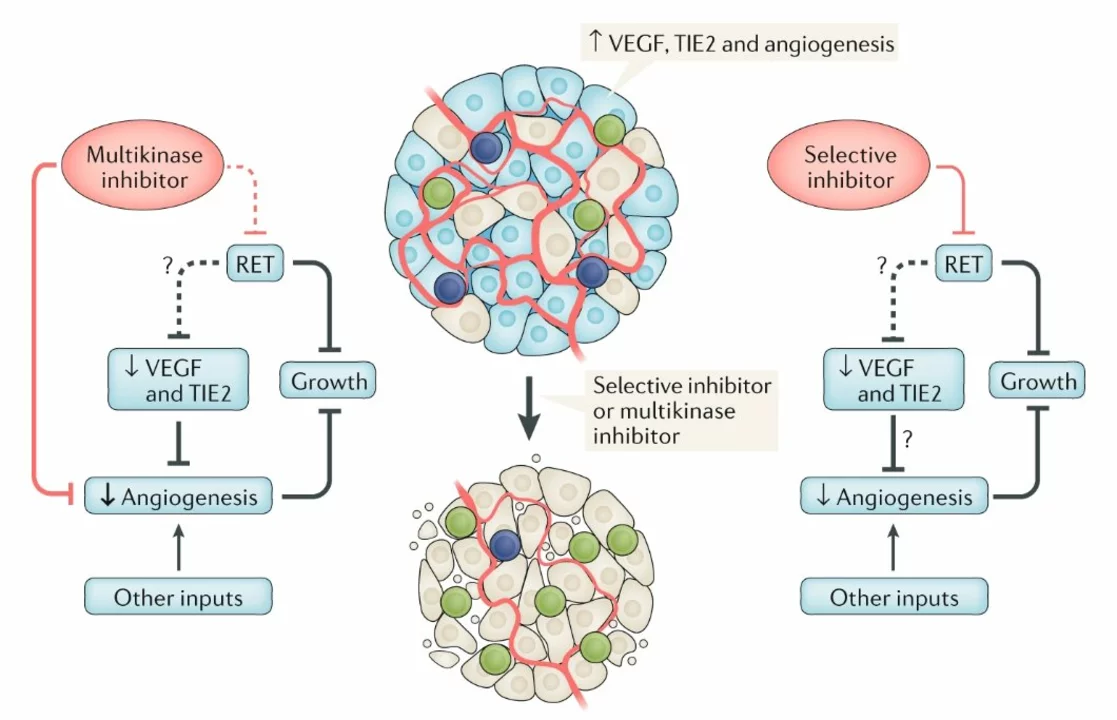
Introduction to Calcitonin and Thyroid Cancer
As a blogger, I am passionate about sharing knowledge on various health topics to help my readers better understand their bodies and the potential issues they may face. Today, I am going to discuss calcitonin and its potential as a biomarker for thyroid cancer. The thyroid is a small, butterfly-shaped gland located at the base of the neck. It produces hormones that regulate the body's metabolic rate, heart function, digestion, muscle control, and brain development.
Thyroid cancer occurs when cells in the thyroid gland begin to grow out of control. In recent years, researchers have been exploring the potential use of calcitonin as a biomarker for thyroid cancer. Calcitonin is a hormone produced by the thyroid gland, and its levels can help doctors in diagnosing and monitoring thyroid cancer. In this article, we will take a deep dive into calcitonin, how it can be used as a biomarker, and the benefits of using it in thyroid cancer management.
Understanding the Role of Calcitonin in the Human Body
Before we delve into the connection between calcitonin and thyroid cancer, it's essential to understand the role of calcitonin in the human body. Calcitonin is a hormone produced by the parafollicular C cells of the thyroid gland. It plays a critical role in maintaining calcium homeostasis by regulating the amount of calcium in the blood and bones.
When the levels of calcium in the blood are too high, the thyroid gland releases calcitonin. This hormone then acts on the bones, kidneys, and intestines to decrease the levels of calcium in the bloodstream. It inhibits the activity of osteoclasts (cells responsible for bone resorption) and promotes the excretion of calcium in the urine. Thus, calcitonin helps maintain a balanced level of calcium in the body, which is essential for various physiological functions, such as nerve transmission, muscle contraction, and blood clotting.
Calcitonin as a Potential Biomarker for Thyroid Cancer
Over the past few years, researchers have been investigating the potential use of calcitonin as a biomarker for thyroid cancer. This is because abnormal levels of calcitonin in the blood can be an indicator of the presence of medullary thyroid cancer (MTC) – a rare but aggressive form of thyroid cancer that arises from the parafollicular C cells.
A number of studies have demonstrated that elevated serum calcitonin levels can be an early and reliable marker for the presence of MTC. Moreover, monitoring calcitonin levels during and after treatment can help determine the effectiveness of the therapy and detect any potential recurrence of the cancer. Therefore, calcitonin levels can play a significant role in diagnosing and monitoring the progression of MTC, making it a valuable biomarker for this type of thyroid cancer.
Benefits of Using Calcitonin as a Biomarker in Thyroid Cancer Management
There are several benefits of using calcitonin as a biomarker in the management of thyroid cancer, particularly MTC. Some of these benefits include:
Early Detection and Diagnosis
By measuring serum calcitonin levels, doctors can detect MTC at an early stage, even before the appearance of clinical symptoms. This early detection can lead to a more accurate diagnosis and prompt treatment, improving the chances of a successful outcome for the patient.
Monitoring Treatment Effectiveness
Monitoring calcitonin levels during and after treatment allows doctors to assess the effectiveness of the therapy. A decrease in calcitonin levels indicates a positive response to the treatment, while persistently elevated levels may signal the need for further intervention.
Detecting Cancer Recurrence
Regular monitoring of calcitonin levels after treatment can help detect any recurrence of MTC. An increase in calcitonin levels may indicate the presence of residual or recurrent cancer, enabling doctors to initiate appropriate follow-up care and treatment.
Reducing Unnecessary Diagnostic Tests
Using calcitonin as a biomarker can help reduce the need for unnecessary diagnostic tests, such as imaging studies or invasive procedures like fine-needle aspiration or biopsy. This not only saves time and resources but also minimizes the risk of complications associated with invasive procedures.
Limitations and Challenges of Calcitonin as a Biomarker
While calcitonin has shown promise as a biomarker for MTC, there are some limitations and challenges associated with its use. First, elevated calcitonin levels can also be seen in conditions other than MTC, such as chronic kidney disease, hyperparathyroidism, and neuroendocrine tumors. This may lead to false-positive results, causing unnecessary anxiety and additional testing for the patient.
Second, the sensitivity and specificity of calcitonin as a biomarker may vary depending on the assay used to measure its levels. Different assays may produce varying results, leading to potential misinterpretation of calcitonin levels. Thus, establishing standardized protocols and guidelines for calcitonin measurement is crucial for its accurate and reliable use as a biomarker for thyroid cancer.
Conclusion
In conclusion, calcitonin shows great potential as a biomarker for medullary thyroid cancer. Its ability to detect the presence of MTC at an early stage, monitor treatment effectiveness, and identify cancer recurrence makes it a valuable tool in the management of this aggressive form of thyroid cancer. However, further research and standardization of calcitonin measurement techniques are needed to overcome the limitations and challenges associated with its use. As we continue to learn more about the role of calcitonin in thyroid cancer, we can hope for improved diagnostic and treatment strategies, ultimately leading to better outcomes for patients.






12 Comments
Your glorified hype about calcitonin is nothing but sensationalism; you ignore the messy reality of false positives and unnecessary anxiety.
/p>Calcitonin, despite its catchy name, is not a magic bullet for thyroid cancer detection. The hormone is produced by parafollicular C cells, and its elevation does correlate with medullary thyroid carcinoma (MTC), but the relationship is far from straightforward. First, assay variability can swing results by orders of magnitude, making cross‑laboratory comparison a nightmare. Second, non‑malignant conditions such as chronic kidney disease, hyperparathyroidism, and even certain neuroendocrine tumors can spur modest rises in serum calcitonin. Third, the prevalence of MTC in the general population is low, which drags down the positive predictive value of any screening test. Fourth, the cost of routine calcitonin screening across all thyroid nodules is not justified when ultrasound risk stratification already offers a high‑yield pathway. Fifth, false‑positive results lead to unnecessary biopsies, patient anxiety, and potential overtreatment. Sixth, guidelines from the American Thyroid Association recommend targeted calcitonin testing only when clinical suspicion exists, rather than blanket ordering. Seventh, longitudinal monitoring of calcitonin after thyroidectomy does provide a reliable marker for residual disease, but only if the baseline postoperative level was accurately documented. Eighth, the kinetics of calcitonin decline post‑surgery can inform prognosis, yet many clinicians overlook this nuance. Ninth, emerging pentagastrin or calcium stimulation tests can unmask occult MTC, but they are cumbersome and not widely available. Tenth, the field is actively researching more specific biomarkers, such as procalcitonin fragments and circulating tumor DNA, which may eventually supplant calcitonin. Eleventh, patient education is essential; many patients misinterpret a mildly elevated calcitonin as a definitive cancer diagnosis. Twelfth, clinicians should always interpret calcitonin results in the context of the entire clinical picture, not in isolation. Thirteenth, multidisciplinary tumor boards help avoid tunnel vision when a single marker dominates decision‑making. Fourteenth, insurance coverage for routine calcitonin testing remains patchy, adding another layer of complexity. Fifteenth, in summary, calcitonin is a useful tool when applied judiciously, but it is far from the universal biomarker some popular articles portray it to be.
/p>While many celebrate calcitonin as a definitive marker for medullary thyroid carcinoma, the data reveal a more nuanced picture. Numerous studies have demonstrated substantial inter‑assay variability, undermining the reliability of a single threshold. Moreover, elevations can arise from benign conditions, thereby compromising specificity. One must also consider the psychological burden imposed on patients by ambiguous results. The purported advantage of early detection is often offset by the cascade of invasive follow‑up procedures. Consequently, the enthusiasm surrounding calcitonin may be disproportionate to its actual clinical utility. In practice, a multimodal approach that includes imaging and histopathology remains paramount. Therefore, the claim that calcitonin alone can revolutionize thyroid cancer management warrants skepticism.
/p>Calcitonin testing is overhyped and drives unnecessary panic. Stop treating a lab value as gospel.
/p>It’s almost eerie how the medical establishment pushes calcitonin like a silver bullet while conveniently glossing over the shadowy side effects that lurk beneath the surface. From the moment the hormone was first isolated, whispers began about its manipulation behind closed doors, aimed at inflating pharmaceutical profits. The very labs that validate calcitonin assays are often funded by the same conglomerates that sell the costly drugs used to treat MTC. This creates a vicious feedback loop where higher test utilization justifies higher drug sales. Add to that the fact that false‑positive elevations are routinely dismissed as “benign variations,” leaving countless patients in a state of perpetual dread. Imagine being told your calcitonin is slightly up, while the doctor assures you it’s nothing, yet you can’t shake the lingering fear of hidden cancer. The drama doesn’t stop there; certain “research” papers conveniently omit data that would reveal the assay’s lack of specificity in patients with renal impairment. Moreover, the push for routine screening in low‑risk populations appears to be a covert strategy to funnel more money into the healthcare system. The media, eager for sensational headlines, amplifies the narrative that calcitonin is the ultimate early detector, without mentioning the costly downstream procedures that follow. As a result, patients are subjected to unnecessary ultrasounds, fine‑needle aspirations, and even surgeries that could have been avoided. Over the years, whistleblowers have hinted at data suppression, yet their testimonies are buried under layers of corporate legalese. The whole scenario feels like a carefully choreographed performance, where every actor – from the researcher to the clinician – plays a part in maintaining the illusion. While some genuinely believe in calcitonin’s utility, we must remain vigilant and question who truly benefits from its widespread adoption. In the end, the truth may be far less glamorous than the hype suggests, but it is crucial for patients to demand transparency. Only then can we cut through the drama and focus on truly evidence‑based diagnostics.
/p>The allure of a single biomarker lies in its promise of simplicity amidst the complexity of human biology. Yet, calcitonin, like any molecule, exists within a web of physiological interactions that defy reductionist interpretation. When we isolate its concentration, we risk overlooking the broader context of calcium homeostasis, renal function, and neuroendocrine activity. A philosophical stance invites us to question whether precision medicine should prioritize holistic assessment over singular metrics. In the case of medullary thyroid carcinoma, calcitonin offers valuable insight, but only when integrated with patient history and imaging findings. The ethical dimension emerges when clinicians communicate uncertain results; transparency fosters trust, whereas omission breeds mistrust. Moreover, the epistemic limits of our assays remind us that science is provisional, not absolute. Embracing this humility can guide more compassionate patient care. Ultimately, the pursuit of biomarkers should complement, not replace, the art of medicine. In that balance, we may find both clarity and compassion.
/p>People love to tout calcitonin like it’s a miracle cure but they ignore the data that shows huge false positive rates especially in people with kidney issues the assays are inconsistent across labs leading to wildly different numbers doctors then chase numbers instead of symptoms it creates a costly treadmill of tests that benefits labs more than patients we need to step back and ask who really gains from this hype
/p>Wow great, another “expert” telling us the labs are lying – thanks for the groundbreaking insight 🙄
/p>In fact, recent meta‑analyses confirm that calcitonin’s sensitivity for detecting medullary thyroid carcinoma exceeds 90 % when appropriate cut‑offs are applied.
/p>That’s exactly the line they feed you in conferences.
/p>Hey everyone! I’ve been reading up on calcitonin and it’s fascinating how it can signal early thyroid issues 😊 However, it’s also true that other conditions can bump the levels up, so doctors need to look at the whole picture 🧐 If you’re getting tested, ask your doctor about the assay’s accuracy and what the numbers really mean. Stay curious and healthy! 🌟
/p>One could argue that every lab value is a shadow of a deeper physiological narrative, and calcitonin is no exception. It whispers clues about calcium balance, yet its voice is often drowned by institutional protocols. By embracing a more holistic lens, we might demystify its role without succumbing to alarmism. Nevertheless, the data remain a valuable compass for clinicians navigating medullary thyroid carcinoma. In the end, balance between skepticism and utilization is the key.
/p>